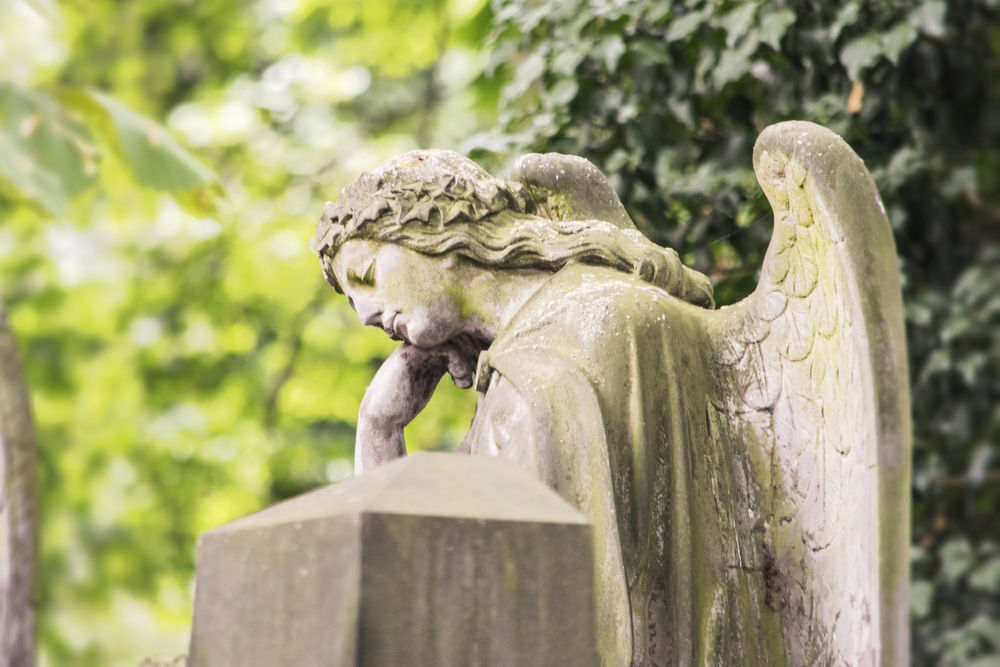Ever have a friend question the Catholic practice of praying to the dead? How do you respond to them?
Pondering what Jesus teaches us about death I noticed five significant events that occur in the Gospels which give us important spiritual insight.
The Transfiguration
Jesus takes Peter, James and John up on Mount Tabor to pray and becomes transfigured before them. “And behold, two men talked with Him, Moses and Elijah, who appeared in glory and spoke of His exodus…” (Luke 9:30)
Jesus shows his Apostles (and us) that these men are not dead. We know Elijah was taken into heaven (2 Kings 2:11), and speculation is that perhaps Moses was as well. These ancient holy men still know, and are still concerned with, earthly happenings. This offers us a glimpse of eternity.
Jesus tells us that the “God of Abraham, and the God of Isaac, and the God of Jacob,” “He is not God of the dead, but of the living…” (Mark 12:26-27). This tells us that the ancient Patriarchs, though dead, live.
Talitha Koum
The daughter of Jairus died. Jesus enters the room and tells the mourners, “Do not weep, for she is not dead but sleeping.” Though they mock him, Jesus takes her hand and says, “Child, arise.” (Luke 8:49-56)
And she does, and they feed her food.
Christ alters the perception of death, which is not an end, but a rising to new life.
Her body was dead (asleep awaiting the resurrection) but her immortal soul which had indwelled there lived. When reunited to her body by Christ’s grace, both live.
Hope from hopelessness.
Widow of Nain’s son
Jesus takes pity on the widow’s loss of her only son saying, “Do not weep.” He touches the bier and says, “Young man, I say to you, arise.” (Luke 7:14)
And he sits up and begins to speak.
Jesus restores the son to the widow, but shows that the son was not truly lost to death. Though reunited in life, they are reassured that they can be reunited and dwell in the presence of the Lord after death.
So can we.
Lazarus
Jesus knew Lazarus was dying, but he waits. Then he says, “Our friend Lazarus has fallen asleep, but I go to wake him out of sleep.” (John 11:11) Jesus was moved by Lazarus’ death, but he knew that it was for the glory of God, and for our belief.
Lazarus lay dead four days. Jesus orders the stone rolled away and calls, “Lazarus, come out.”
And he does. Lazarus walks out of the tomb, still bound hand and foot. The tomb cannot hold those who listen to Christ’s voice.
Mary had said to Him, “Lord, if you had been here, my brother would not have died.” She had understood His physical presence, but not the power of His spiritual presence. Now she knew that in Christ Jesus, there is no death.
So what is death?
Sin.
That which cuts us off from the life we share in Christ. Sin binds us to the tomb.
Though Lazarus was bound, Jesus called out, “Unbind him and let him go.” Lazarus’ new life is tied to him being unbound.
And if you don’t believe that it is sin that brings death, here’s another resurrection story from the Gospels:
Jesus Christ
“Surely he has borne our grief and carried our sorrows…he was wounded for our transgressions, he was bruised for our iniquities; upon him was the chastisement that made us whole, and with his stripes we are healed…and the Lord laid on him the iniquity of us all.” (Isaiah 53:4-6)
Jesus’ death is directly due to our sins, our broken relationship with God.
Yet He and the Father are one, the grave cannot hold Him. Jesus is the firstborn from the dead. (Colossians 1:18)
He leaves behind the bindings and wrappings, rolls away the stone, exits the tomb and walks into the light of a new morning. (1 Corinthians 15:55)
We believe that in death, though our body sleeps awaiting the day of our resurrection, that if we have believed in Him, followed His commandments and died to sin, that our soul lives with Him. (2 Timothy 2:11)(Romans 6:5-11)
Prayer to the dead
Some misconceive that we pray to the dead the way we pray to the Lord, in praise. Catholics don’t worship the dead. We believe that saints and other holy men and women are not bound by sin to the death of the grave, but live in the very presence of the Lord.
We ask them for help, intercession and guidance; that they pray for us and offer our petitions in God’s holy presence.
We don’t pray to the dead, we speak to those holy exemplars whose bodies have fallen asleep.

